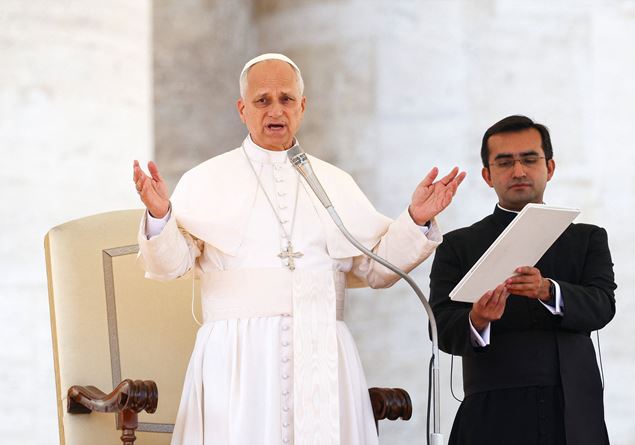In front of 15 thousand educators in St. Peter’s Square, a passionate appeal to put human relationships back at the centre. Speaking not only as Pontiff, but also as a former teacher in the institutions of the Order of St. Augustine, Leo XIV offered a profound reflection on the educational mission, tracing a path based on four key points: interiority, unity, love and joy.
As regards the first pillar, Lion warns: «We live in a world dominated by often superficial screens and technological filters, in which students need help to get in touch with their inner self. And not just them. In fact, even for educators, who are frequently tired and overloaded with bureaucratic tasks, the risk is real.” Citing Saint Augustine, the Pope recalled that «the sound of our words hits the ears, but the true master is inside.” It is a mistake, he underlined, to think that “beautiful words or good classrooms, laboratories and libraries” are enough». These are only means; the truth circulates “in the profound encounter of people”.
The second pillar, unity, is a concept that the Pope linked to his own episcopal motto In Illo uno unum. This Augustinian expression «remembers that only in Christ do we truly find unityas members united to the Head and as traveling companions on the path of continuous learning of life”, explains the Holy Father. In this vein, Leo XIV made the precise programmatic commitment to resume and update the project of Global Educational Pactwhich had been one of the prophetic intuitions of his predecessor, Pope Francisunderlining that education is a community act and not an individual one.
The third word, love, was the vehicle for the speech’s strongest social warning. «Sharing knowledge is not enough to teach: you need love. Only in this way will it be profitable for those who receive it, in itself and also and above all for the charity it conveys. Teaching can never be separated from love, and a current difficulty in our societies is that of no longer knowing how to sufficiently value the great contribution that teachers and educators give to the community in this regard.” However, His Holiness pointed out that attention must be paid, since damaging the social and cultural role of trainers is equivalent to mortgaging their future, and he adds that a crisis in the transmission of knowledge brings with it a crisis of hope.
The last key point is joy, a fundamental element for teaching. According to Leone in fact true teachers “educate with a smile and their challenge is to be able to awaken smiles in the depths of the souls of their disciples”.
Pope Prevost also raises an alarm bell because «Today, in our educational contexts, it is worrying to see the growing symptoms of widespread internal fragility, at all ages. We cannot close our eyes to these silent calls for help, rather we must strive to identify the underlying reasons. Artificial intelligence, in particular, with its cold and standardized technical knowledge, can further isolate already isolated students, giving them the illusion of not needing others or, even worse, the feeling of not being worthy of them. The role of educators, however, is a human commitment, and the joy of the educational process itself is entirely human.”
The Pontiff concluded his speech by inviting them to make these four values the cornerstones of their mission towards students. Exhorting them through the words of Jesus: “Whatever you did to one of the least of these brothers of mine, you did to me.”
Finally addressing the educators, he thanked them for the precious work they do, blessing them from the heart and assuring them of his prayers for them.


